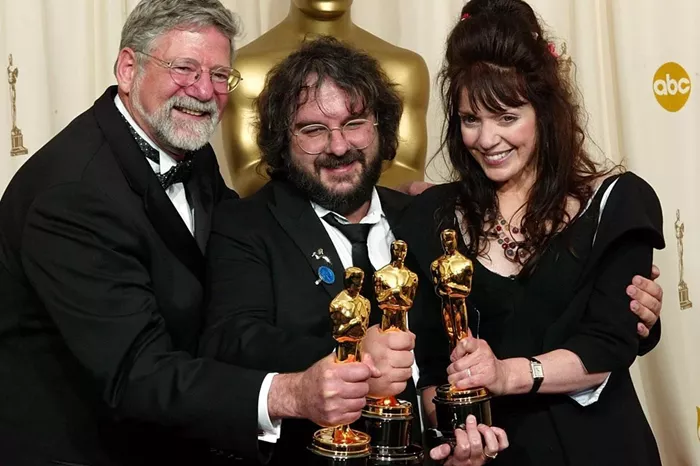The Lord of the Rings: The Return of the King, released in 2003, marked the final chapter of Peter Jackson’s epic fantasy trilogy. Based on J.R.R. Tolkien’s legendary work, the film not only captivated audiences worldwide but also made history at the 76th Academy Awards in 2004.
With 11 Oscar wins out of 11 nominations, it tied the record for most Academy Awards won by a single film. The other two films in this elite group are Ben-Hur (1959) and Titanic (1997). However, Return of the King stands alone as the only fantasy film to sweep every category it was nominated in. This level of critical and industry acclaim cemented its legacy in both cinematic and awards history.
Dominance at the Academy Awards
At the Academy Awards, the film’s achievements were unprecedented. It won every category in which it was nominated, including Best Picture, Best Director for Peter Jackson, and Best Adapted Screenplay.
The sweep was more than a tribute to a single film. It honored the entire trilogy’s scope, craftsmanship, and cultural significance. The Academy’s recognition reflected years of meticulous production, stellar performances, and revolutionary visual effects.
Key Oscar Wins
The 11 Oscars won included:
- Best Picture
- Best Director – Peter Jackson
- Best Adapted Screenplay
- Best Art Direction
- Best Costume Design
- Best Film Editing
- Best Makeup
- Best Original Score
- Best Original Song – “Into the West”
- Best Sound Mixing
- Best Visual Effects
These wins demonstrated excellence across all aspects of filmmaking, from storytelling and direction to music and technical execution.
Record-Tying Achievement
By winning 11 Oscars, The Return of the King joined the elite company of Ben-Hur and Titanic. What sets it apart is its 100% success rate. No other film has ever won every category it was nominated in with such a high number of nominations.
This feat emphasized the film’s overwhelming impact and solidified its place in Oscars history. Many analysts and fans still view it as one of the most deserving Oscars Winners of all time.
Celebrating a Trilogy’s Culmination
The Oscars recognition was not just about The Return of the King as an isolated film. It was a tribute to the entire Lord of the Rings trilogy, which had been largely overlooked in previous Academy Awards seasons despite nominations.
Peter Jackson and his team treated the trilogy as a single, interconnected cinematic work. The final film’s Oscars sweep served as retroactive praise for the consistent excellence of all three films.
Award Momentum Built Over Time
The trilogy’s first installment, The Fellowship of the Ring, earned 13 nominations in 2002, winning four. The Two Towers followed with six nominations in 2003, winning two. By the time Return of the King debuted, the momentum and appreciation had fully matured.
This pattern showed a growing admiration from critics and Academy voters, culminating in a historic finale.
Fan and Critical Reception
Audience support played a major role. The film resonated with fans and critics alike. It earned critical acclaim for its emotional depth, visual mastery, and loyalty to Tolkien’s vision. Box office performance was also strong, generating over $1.1 billion worldwide.
This blend of commercial success and artistic achievement made it an undeniable choice for Oscar recognition.
Beyond the Oscars: Other Prestigious Honors
Although the Oscars represented the peak of awards recognition, Return of the King also triumphed in other ceremonies. It swept the BAFTAs, won Golden Globes, and earned a special place in genre-specific honors like the Saturn Awards.
Each of these accolades reinforced its status as a cultural and artistic milestone.
Recognition from the Golden Globes and BAFTAs
The film won Best Picture (Drama) and Best Director at the Golden Globes. It also took home five BAFTA Awards, including Best Film and Best Adapted Screenplay. These wins validated its global appeal and artistic integrity.
International bodies and critics across continents praised Jackson’s direction, the ensemble cast’s performances, and the technical marvels that brought Middle-earth to life.
Genre Awards and Legacy Honors
At the Saturn Awards, which focus on science fiction, fantasy, and horror, the film was a standout winner. It received honors for Best Fantasy Film, Best Director, and Best Supporting Actor (Andy Serkis as Gollum).
In subsequent years, the trilogy has continued to receive recognition in retrospective honors and rankings, including mentions in discussions surrounding the Olivier Award for its theatrical adaptations.
Impact on the Film Industry
Return of the King transformed how Hollywood and the global film industry viewed fantasy storytelling. It proved that fantasy films could be taken seriously by major awards bodies and appeal to a wide audience.
This acceptance paved the way for future fantasy and science fiction films to gain critical recognition, from Pan’s Labyrinth to Avatar and even Marvel’s blockbuster entries.
Changing the Awards Landscape
Before Jackson’s trilogy, genre films were often dismissed during awards season. After 2004, Academy voters began to treat them with increased respect, considering production value, narrative depth, and directorial innovation.
This shift has allowed more diverse film genres to be represented in major categories at the Oscars and other prestigious ceremonies.
Influence on Future Filmmaking
The trilogy’s production set a new standard for long-form storytelling, world-building, and franchise filmmaking. Its success inspired studios to invest in similarly ambitious projects, such as Harry Potter, Game of Thrones, and The Witcher.
The Academy Awards triumph of Return of the King demonstrated that technical excellence and genre storytelling could co-exist in modern cinema.
Conclusion
The Lord of the Rings: The Return of the King didn’t just win awards—it changed the perception of what fantasy films could achieve. With 11 Oscars, including Best Picture and Best Director, it remains one of the most honored films in Hollywood history.
Its sweeping victory at the Oscars signaled a turning point in cinema. The film set a benchmark not only for epic storytelling but for technical and artistic innovation across genres.

